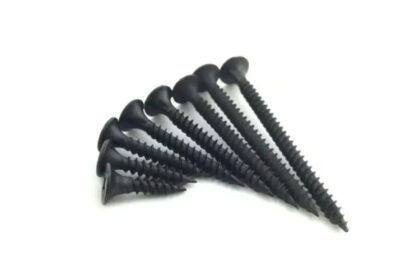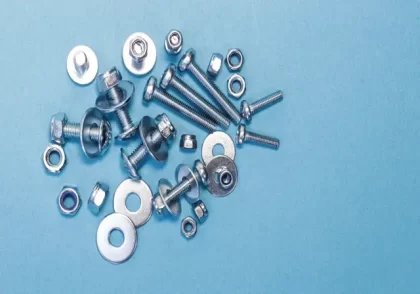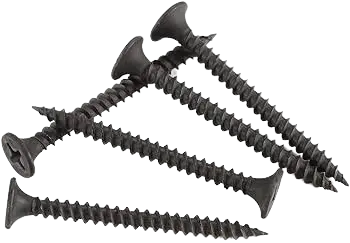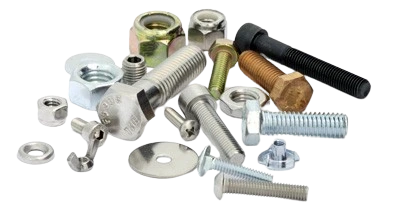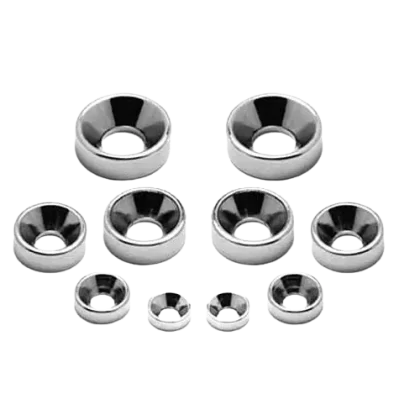What are Washers? Their Purpose and Types
A Guide to Washers: Understanding Their Purpose and Types
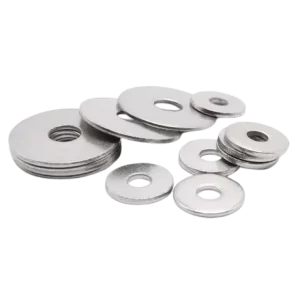
Washers are like tiny bodyguards for screws and bolts. They're usually small, flat discs, often made of metal or plastic, with a hole in the center.
Imagine a screw trying to hold two pieces of wood together. If you just twisted the screw in without a washer, it would be like a tightrope walker balancing on a thin wire—all the pressure would be focused on one tiny spot. But if you add a washer, it's like giving the tightrope walker a safety net. The washer spreads the pressure out, making it less likely that the wood will crack or the screw will wiggle loose.
Washers might be small, but they have a big job to do. They protect surfaces from scratches, keep things from rattling, and make sure screws and bolts stay tight. So next time you see a washer, remember—it's not just a tiny piece of metal, it's a powerful protector, keeping things together one screw at a time.
Purpose of Washers
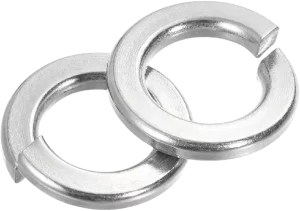
Load Distribution: The primary function of a washer is to spread the load of a nut or bolt over a larger area. Think of it like placing a coaster under a drink glass to prevent it from leaving a ring on the table. By distributing the pressure, washers prevent the fastener from digging into the material, protecting it from damage and ensuring a stronger, more secure hold.
Corrosion Prevention: Different metals can react poorly when in close contact, leading to galvanic corrosion. Washers act as a barrier, preventing this electrochemical reaction and preserving the integrity of both the fastener and the surrounding material.
Vibration Absorption: Machines and structures are often subjected to constant vibrations, which can loosen fasteners over time. Washers, with their dampening properties, absorb these vibrations, acting as tiny shock absorbers that keep your connections secure.
Alignment : Even the most precisely machined components can have slight misalignments. Washers bridge these gaps, ensuring that nuts and bolts seat properly, leading to a more accurate and stable connection.
Insulating Shields: Not all washers are made of metal. Plastic and nylon washers provide electrical insulation, protecting components from stray currents and preventing short circuits.
Visual Enhancements : While not their primary function, some washers add a decorative touch to exposed hardware. From the rustic charm of a wrought iron fender washer to the sleek lines of a stainless steel square washer, these little discs can even enhance the aesthetics of your project.
Types of Washers
Flat Washers

Flat washer is a thin, circular disc with a central hole. Made from metal, plastic, or nylon, it's all about spreading the load. Picture a screw driven into wood; without a flat washer, the pressure concentrates around the screw, potentially splitting the wood. Enter the flat washer! It distributes the pressure over a larger area, protecting the material and preventing damage. But its job doesn't stop there. Flat washers can also act as insulators, preventing electrical contact between the fastener and the surface.
Fender Washers
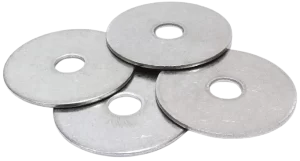
Think of the fender washer as the flat washer's big brother. It's similar in design but boasts a larger diameter and a smaller hole. This makes it the perfect partner for wood or sheet metal, where it spreads the load even further and prevents tearing. But the fender washer is a multi-tasker too. It can act as a spacer or shim, creating a gap between parts when needed.
Split Washers

Now, let's talk security. The split washer, a type of lock washer, is here to prevent fasteners from loosening under vibration or movement. Imagine a tiny coil spring built into a washer. As the nut or bolt tightens, the split ring expands, creating friction against the surface and the fastener. This grip means vibration won't budge them! You'll often find split washers in engines or machinery, where keeping things secure is paramount.
Conical Washers
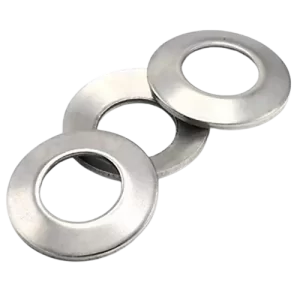
This washer brings a touch of springiness to the party. Also known as a disc spring, it has a unique conical shape with a thick base and a thinner top. This design allows it to provide a constant spring tension between the fastener and the surface, even as the load changes. Think of it as a built-in shock absorber! Conical washers are ideal for applications involving thermal expansion or dynamic loads, like in heavy machinery or high-temperature environments.
Countersunk Washers
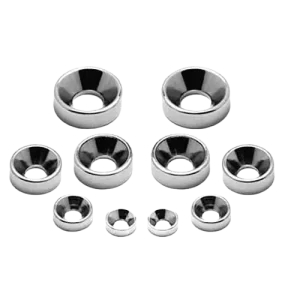
Countersunk washer also known as a finishing washer. This one's all about aesthetics. Imagine a washer with a cone-shaped profile. When the fastener is tightened, it sits flush with the surface, creating a clean, finished look. This makes it a favorite in applications where appearances matter, like furniture or decorative woodwork.
Square Washers
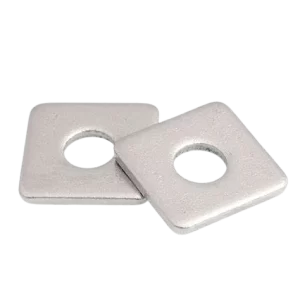
Square washers have a square shape instead of a circular one. They are commonly used in applications where a standard round washer might rotate or become misaligned. The square shape helps to keep the washer in place, ensuring proper distribution of load.
Wave Washers
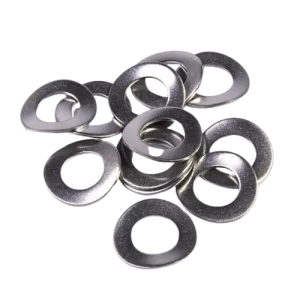
Wave washers, also known as wave springs or wavy washers, have a wavy or corrugated shape. This design allows them to exert a spring force when compressed, making them suitable for applications where flexibility and vibration absorption are essential.
Material Used To Make Washers
Washers are crafted from a variety of materials to meet the diverse demands of different applications. The choice of material not only affects the washer's durability but also determines its resistance to factors such as corrosion, electrical conductivity, weight, and insulation. Here's an in-depth look at some common materials used to manufacture washers:
Steel:
Carbon Steel: Robust and cost-effective, carbon steel washers are suitable for general applications.
Stainless Steel: Resistant to corrosion, stainless steel washers are ideal for environments where moisture exposure is a concern.
Brass:
Brass washers offer a balance of corrosion resistance and electrical conductivity, making them suitable for various applications, including electrical components.
Aluminum:
Lightweight and corrosion-resistant, aluminum washers find use in applications where weight reduction is critical, such as in aerospace and automotive industries.
Nylon:
Nylon washers are non-conductive and lightweight, making them excellent choices for electrical insulation. They also provide good resistance to chemicals.
Rubber:
Rubber washers excel in vibration damping applications, providing noise reduction and shock absorption. They are commonly used in machinery and automotive settings.
Fiber:
Fiber washers, often crafted from materials like paper or cellulose, are lightweight and can provide insulation. They are used in various industries, including plumbing.
Bronze:
Bronze washers offer a combination of strength and corrosion resistance. They are suitable for applications where durability is essential, such as marine environments.
Plastic:
Various plastic materials, including polyethylene or PVC, are employed for washers, providing corrosion resistance and electrical insulation.
Copper:
Copper washers are valued for their excellent electrical conductivity and corrosion resistance, making them common in electrical applications.
Titanium:
Titanium washers, known for being lightweight, strong, and corrosion-resistant, are used in high-performance applications, such as aerospace and medical devices.
The diverse materials used in washer production cater to specific needs across industries, from construction and machinery to electronics and beyond. Understanding the properties of these materials allows for informed choices, ensuring that washers contribute not only to the mechanical stability of connections but also to the overall efficiency and longevity of the systems they support.
Conclusion
Washers, often overlooked in toolkits, are essential in construction and maintenance. Flat washers distribute load, preventing damage and acting as electrical insulators. Fender washers, with a broader diameter, find use in diverse applications like woodwork. Split washers enhance security, resisting loosening under vibrations in machinery. Conical washers offer spring-like tension in dynamic settings, while countersunk washers contribute to a polished finish in visible areas. Beyond functionality, washers add a touch of style, elevating the aesthetic appeal of projects. These unsung heroes ensure longevity, stability, and a seamless finish—indispensable elements in the world of tools and craftsmanship.
For more information on this blog or to learn more about fasteners, feel free to contact us. Termscript Fasteners, as leading fasteners manufacturers in Pune, our dedicated team is ready to guide you.
